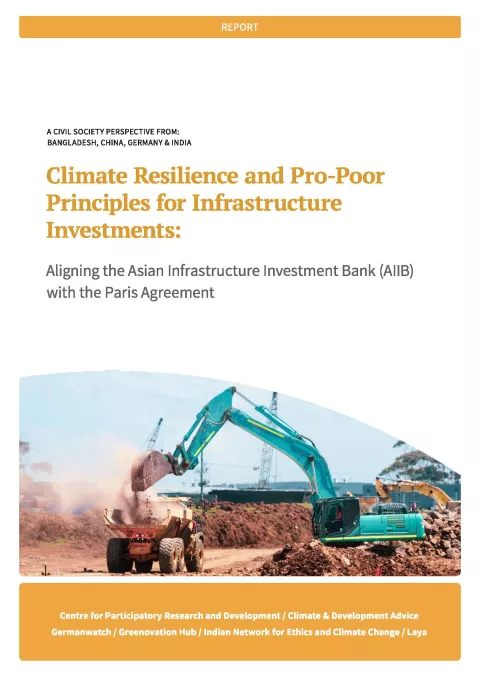
A common civil society perspective from Bangladesh, China, India and Germany: Results of a study on climate resilience and infrastructure investments of the AIIB
This october over 500 development finance institutions convened for the second time at the Finance in Common Summit (FiC) in Italy. This marked an important moment ahead of the UN Climate Conference in Glasgow starting on November 1. A central point on the FiC’s agenda was the role development banks play in reinforcing the global financial architecture towards sustainable development. Multilateral development banks like the Asian Infrastructure Investment Bank (AIIB) are often key actors in this regard by providing loans to developing countries for essential infrastructure, de-risking investments and setting progressive trends for their national peers. The outcome of last year’s FiC was a pledge to mobilize funds equivalent to 10% of annual global investments and increase ambitions with regard to climate, biodiversity and health in the form of a joint declaration. However, the declaration did not mention any concrete measures to achieve these goals and some of the world’s biggest financial institutions, such as the World Bank – or the AIIB –, did not give their endorsement. This year’s summit could produce tangible results to advance the transformation towards climate-resilient and low-carbon infrastructure.
Future infrastructure investments could make or break the achievement of the 1.5° goal. Investing in sustainable infrastructure is a prerequisite to lift hundreds of millions out of poverty, fulfil their basic rights to adequate food, access to water, health, education and housing, and to realize the Sustainable Development Goals. By 2030, USD 6 trillion are projected to be invested in urban, energy, water, information and communications technology, and transport infrastructure every year. 70% of it will occur in the developing world, mostly in Asia.
The AIIB is the fastest growing multilateral development bank, both in terms of members and investments. Although it has pledged to align its investment standards with the Paris Agreement, climate risks often remain insufficiently considered during project assessments. Neither is it a standard process to mainstream the integration of adaptation options into all infrastructure projects. Yet, these are critical prerequisites to improve the resilience of the communities in which projects are implemented. In some cases, new infrastructure even carries the risk of lowering the resilience of the people it is meant to serve. Germany, as the biggest non-Asian stakeholder of the AIIB alongside its European partners, bears a special responsibility to influence the course the bank will take in the future.
This report suggests ten pro-poor and climate resilient principles for the AIIB to better align with the Paris Agreement and points out concrete steps to implement these criteria. Recommendations include more transparency, inclusion of vulnerable populations in the implementation process and creation of a new funding window dedicated to people-centred resilience-building and green infrastructure projects. A previous report focused on AIIB’s contribution to achieving carbon-neutrality.
With COP26 just around the corner, the FiC coalition could be a forum where an ambitious path toward human-rights-based, community-led, climate-resilient and socially just development is set collectively by the banks. Its outcome could be a stepping-stone for the AIIB on its endeavour to sustainability and incentivize more investment in climate-friendly and resilient infrastructure.





